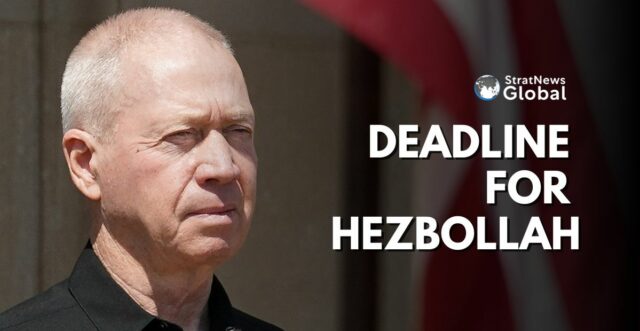Israeli Defence Minister Yoav Gallant told U.S. Defense Secretary Lloyd Austin on Monday that the window was closing for a diplomatic solution to the standoff with the Iranian-backed Hezbollah movement in southern Lebanon.
Gallant’s remarks came as the White House Special envoy Amos Hochstein visited Israel to discuss the crisis on the northern border where Israeli troops have been exchanging missile fire with Hezbollah forces for months.
“The possibility for an agreed framework in the northern arena is running out,” Gallant told Austin in a phone call, according to a statement from his office.
As long as Hezbollah continued to tie itself to the Islamist movement Hamas in Gaza, where Israeli forces have been engaged for almost a year, “the trajectory is clear,” he said.
The visit by Hochstein, who is due to meet Israeli Prime Minister Benjamin Netanyahu, comes amid efforts to find a diplomatic path out of the crisis, which has forced tens of thousands on both sides of the border to leave their homes.
Regional Conflict Concerns
On Monday, Israeli media reported that the head of the army’s northern command had recommended a rapid border operation to create a buffer zone in southern Lebanon.
While the war in Gaza has been Israel’s main focus since the attack by Hamas-led gunmen on Oct. 7 last year, the precarious situation in the north has fuelled fears of a regional conflict that could drag in the United States and Iran.
A missile barrage by Hezbollah the day after Oct. 7 opened the latest phase of conflict and since then there have been daily exchanges of rockets, artillery fire and missiles, with Israeli jets striking deep into Lebanese territory.
Hezbollah has said it does not seek a wider war at present but would fight if Israel launched one.
Israeli officials have said for months that Israel cannot accept the clearance of its northern border areas indefinitely but while troops remain committed to Gaza, there have also been questions about the military’s readiness for an invasion of southern Lebanon.
Political Pressure and Military Casualties
However, some of the hardline members of the Israeli government have been pressing for action and on Monday, National Security Minister Itamar Ben-Gvir, a longtime foe of Gallant, called for him to be sacked.
“We need a decision in the north and Gallant is not the right person to lead it,” he said in a statement on the social media platform X.
Hundreds of Hezbollah fighters and dozens of Israeli soldiers and civilians have been killed in the exchanges of fire, which have left communities on both sides of the border as virtual ghost towns.
The two sides came close to all-out war last month after Israeli forces killed a senior Hezbollah commander in Beirut in retaliation for a missile strike that killed 12 youngsters in the Israeli-occupied Golan Heights.
On Monday, Israel’s defence ministry said it had approved the distribution of 9,000 automatic rifles to civilian rapid response units in northern Israel and the Golan Heights.
(With input from Reuters)





